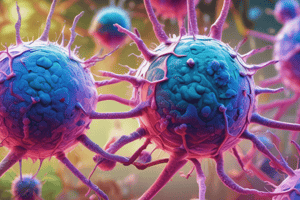Podcast
Questions and Answers
What is the main function of memory cells developed during a primary immune response?
What is the main function of memory cells developed during a primary immune response?
- To eliminate pathogens immediately upon infection
- To produce antibodies without prior exposure to an antigen
- To recognize and respond to future infections by the same pathogen (correct)
- To prevent the development of any immune response
How does artificial immunity differ from natural immunity?
How does artificial immunity differ from natural immunity?
- Artificial immunity is solely generated by the body's immune response
- Natural immunity is exclusively obtained through vaccinations
- Artificial immunity requires the presence of live pathogens
- Artificial immunity develops without any previous infections (correct)
Which best describes the type of immunity that results from vaccination?
Which best describes the type of immunity that results from vaccination?
- Passive immunity through the introduction of foreign antibodies
- Active immunity by stimulating the immune system to produce its own antibodies (correct)
- Temporary immunity that decays rapidly over time
- Natural immunity from prior exposure to a virus
What type of pathogens do current vaccines specifically target?
What type of pathogens do current vaccines specifically target?
In what way can infants acquire natural immunity from their mothers?
In what way can infants acquire natural immunity from their mothers?
What is the primary purpose of booster vaccinations?
What is the primary purpose of booster vaccinations?
Why is active immunity considered long-lasting?
Why is active immunity considered long-lasting?
Which of the following statements about natural immunity is correct?
Which of the following statements about natural immunity is correct?
What is the main reason individuals need booster vaccinations for certain vaccines?
What is the main reason individuals need booster vaccinations for certain vaccines?
What is passive immunity primarily derived from?
What is passive immunity primarily derived from?
Why is herd immunity particularly critical for infants?
Why is herd immunity particularly critical for infants?
What effect can a loss of herd immunity have on a population?
What effect can a loss of herd immunity have on a population?
What does antigenic drift refer to?
What does antigenic drift refer to?
How does influenza virus evolution complicate vaccination strategies?
How does influenza virus evolution complicate vaccination strategies?
What poses a significant challenge to the effectiveness of vaccines?
What poses a significant challenge to the effectiveness of vaccines?
Which pathogen is known for having a particularly high mutation rate?
Which pathogen is known for having a particularly high mutation rate?
What is the crucial primary immune response time frame to develop immunological memory?
What is the crucial primary immune response time frame to develop immunological memory?
What is a major consequence of not vaccinating a population?
What is a major consequence of not vaccinating a population?
What characteristic of tuberculosis aids its capability to survive the immune response?
What characteristic of tuberculosis aids its capability to survive the immune response?
What can lead to antigenic shift?
What can lead to antigenic shift?
What is one way passive immunity is achieved during infections?
What is one way passive immunity is achieved during infections?
What is the relationship between herd immunity and unvaccinated individuals?
What is the relationship between herd immunity and unvaccinated individuals?
Flashcards are hidden until you start studying
Study Notes
Types of Immunity
- Natural Immunity: Develops after infection and involves the body’s response to pathogens.
- Development of Memory: Memory B cells formed during the primary immune response allow for a more rapid secondary immune response upon re-exposure to the same pathogen.
- Maternal Immunity: Infants can acquire natural immunity through antibodies present in breast milk.
Artificial Immunity
- Vaccination: Involves the injection of dead or weakened viruses to stimulate an immune response and develop immunological memory.
- Antigen Recognition: Vaccines contain necessary antigens to prepare the immune system for future exposure to live pathogens.
- Current Scope: Vaccines are primarily designed to protect against viral infections.
Active and Passive Immunity
- Active Immunity: Formed when the body produces its own antibodies in response to infection or vaccination; typically long-lasting with memory B cells.
- Booster Shots: Some vaccines require booster doses to maintain immunity as immunological memory may fade over time.
- Passive Immunity: Involves the transfer of antibodies from one individual or animal to another, providing immediate but temporary protection.
Importance of Vaccination
- Rapid Immune Response: Vaccines prepare the immune system to respond quickly to pathogens, potentially within seven days.
- Time Considerations: Natural immunity development can take approximately two weeks, which is not fast enough for quickly fatal pathogens.
Herd Immunity
- Collective Protection: Achieved when a high percentage of the population is vaccinated, reducing the spread of infections and protecting those unvaccinated.
- Vulnerable Populations: Particularly vital for infants and individuals unable to receive vaccinations due to health reasons.
Ethics of Vaccination
- Risks of Low Vaccination Rates: Decreased vaccination can lead to loss of herd immunity, causing a resurgence of diseases previously under control.
- Examples of Resurgence: Diseases like whooping cough and MMR showed increases in cases due to decreased vaccination rates.
Antigenic Variability
- Impact on Vaccination: Vaccines rely on consistent antigens; however, antigenic drift and shift can result in pathogens altering their surface proteins.
- Antigenic Drift: Refers to minor variations that can lead to new strains.
- Antigenic Shift: Involves significant changes that may create entirely new viral strains.
Influenza Virus Case Study
- High Mutation Rate: Influenza evolves rapidly, necessitating new vaccines annually to combat prevalent strains.
- Role of Unvaccinated Individuals: A higher number of people not receiving the flu vaccine increases opportunities for the virus to mutate.
Evolutionary Race Between Pathogens and Hosts
- Pathogen Adaptation: Pathogens evolve mechanisms to evade host immune systems.
- Tuberculosis (TB): Spreads via respiratory droplets, survives in macrophages due to its thick cell wall, allowing for dormancy and potential reactivation.
- HIV: Rapid mutation of antigens and targeting of helper T cells disrupts the body’s immune response; can remain dormant for years before causing illness.
Studying That Suits You
Use AI to generate personalized quizzes and flashcards to suit your learning preferences.



